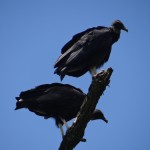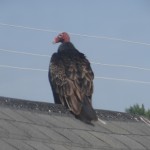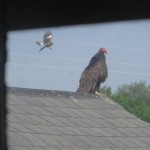My Dad is an armchair bird watcher and usually takes pictures of visitors to his feeders and updates us via Facebook. Suddenly last year, his bird friends began to include regular sightings of vultures in the yard, on the fence and around the buildings. My initial reaction was along the lines of “Oh, that’s interesting!” until they were there daily. My brother is an avid fisherman and I think that fish offal was attracting them and perhaps encouraging a family group to hang about. I began to think this wasn’t so great. You see, back in Texas, I can recall a Boy Scout event we attended in the great Dallas-Fort Worth area. We were out in the open with little shade going on hay wagon rides through the countryside and people wanted to park their cars in what little shade there was. Someone had parked their VW Beetle under a wide spreading Burr Oak and when we returned it was literally covered with wide white gooey streamers of excrement from front to back. Vultures had returned to roost in the tree during that period and PHEW! what a nasty reek. The owners of that car were pretty much out of luck and had to slink off to find someplace to wash their car.
Turkey vultures are a type of raptor, only surpassed in size by eagles and condors. They are common to deciduous woodland and open farm areas. Dark birds, their wings have “fingertips” and their tails extend past their feet. In flight, their wings assume a V shape and they tend to wobble as they soar to catch the thermal currents. Their sense of smell is acute and unique: scent from a mile away will lead to a group of vultures honing in in a circling pattern to locate the exact spot where 12-24 hour old carrion is to be found. Their naked heads are cleaner than feathers would be for this type of food which would otherwise adhere. A turkey vulture’s beak is a powerful tool, but their feet resemble those of a chicken more than the talons of a bird of prey. Their scavenging serves to rid the environment of disease and garbage. They do not prefer truly rotted carcasses, fresher is the preference. And there’s these two interesting factoids to wow you:
1. In the summer, turkey vultures cool off by defecating on their feet. Nice.
2. If harassed or annoyed, they will vomit on the thing that is aggravating them. Icky blech.
A couple weeks ago, I saw two large birds at the top of my old snag White Ash; the camera revealed two juvenile vultures side by side. These must have been quite heavy birds because as they pushed off, the branch they had been perched on crashed to the ground. A week later, a large homely bird was on my kitchen roof sunning itself–an adult vulture. I wasn’t happy to see the white streaks on the roof. However, I captured on video a Mockingbird (which looks tiny next to the vulture) trying to drive the big bird off through repeated dive bombing. It eventually worked to the Mockingbird’s favor. (Click thumbnail photos to enlarge)
- Juvenile turkey vultures on Ash tree
- Adult vulture on roof
- Mockingbird driving off vulture
Youtube videos (click): Mockingbird driving off vulture and Soaring vultures





